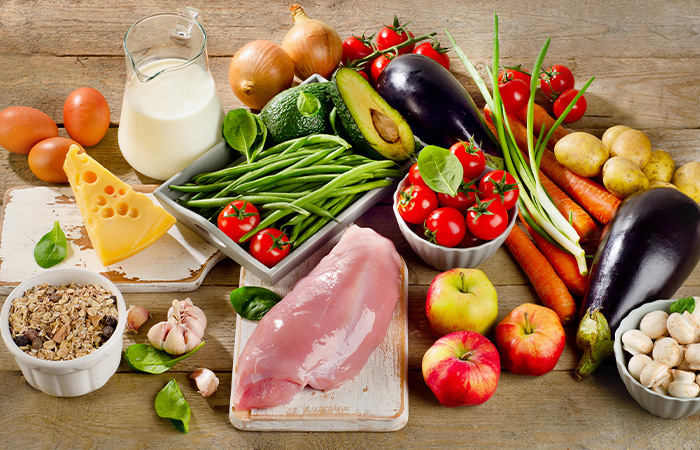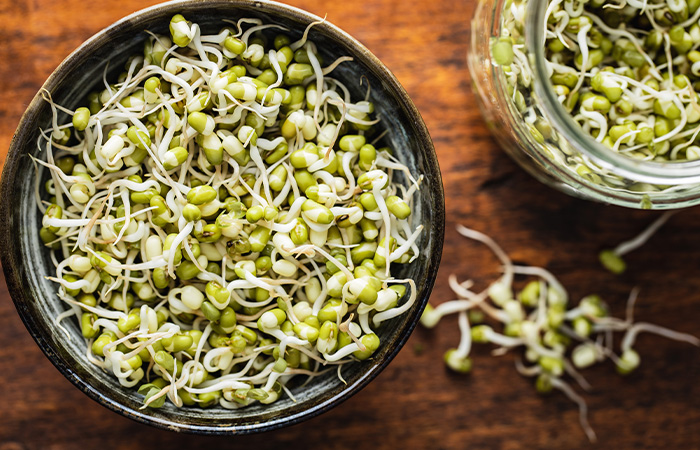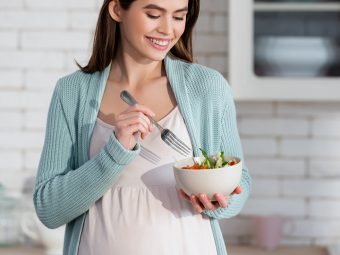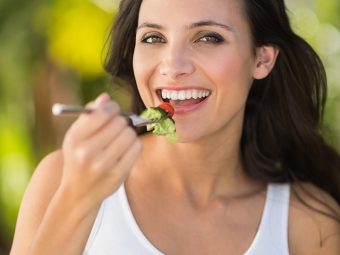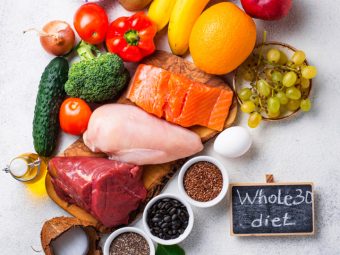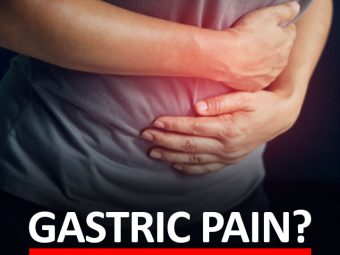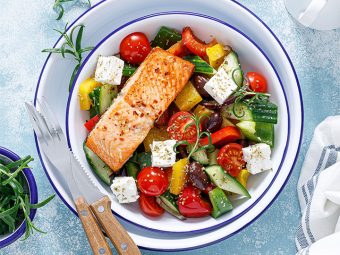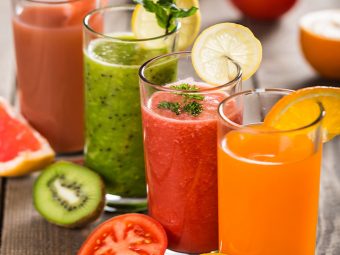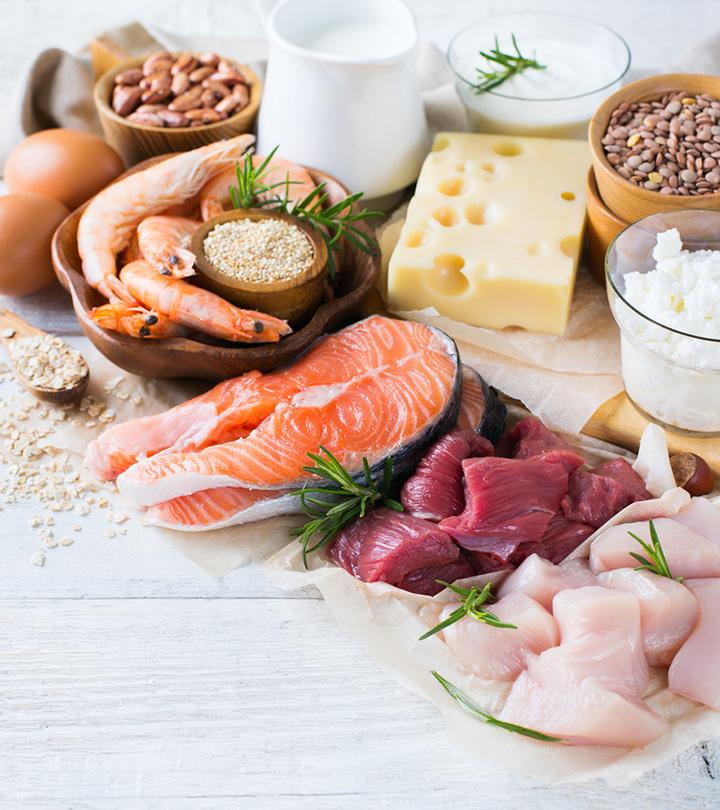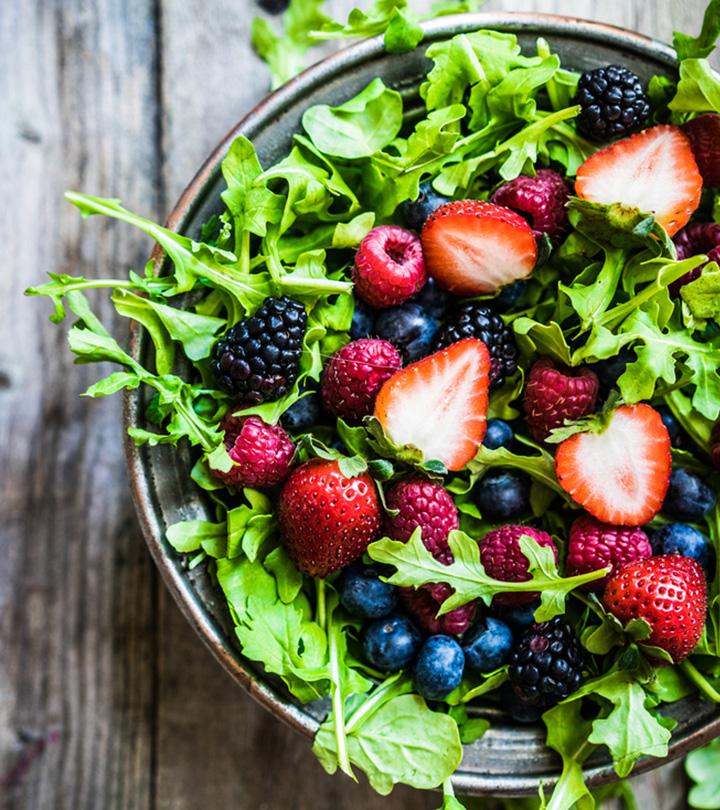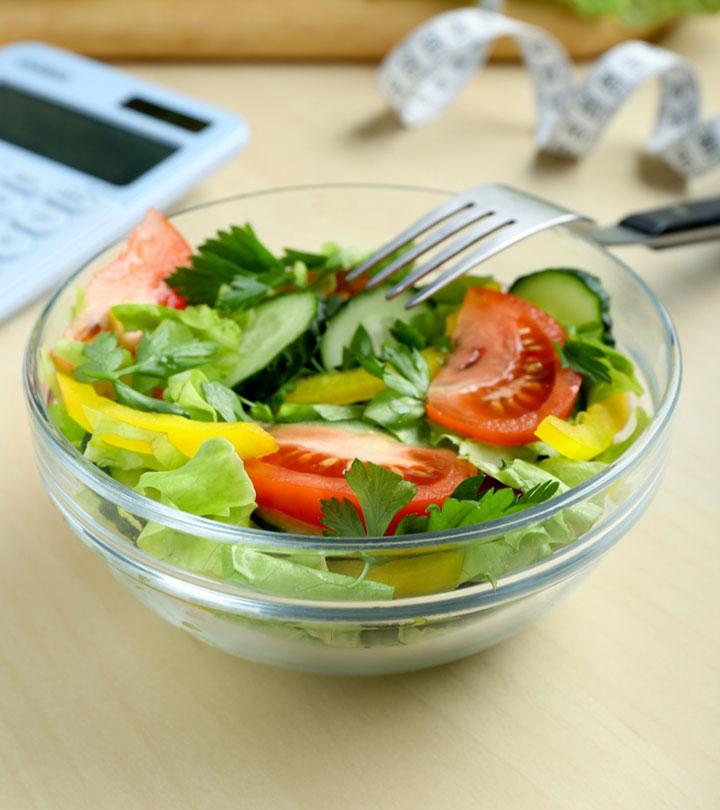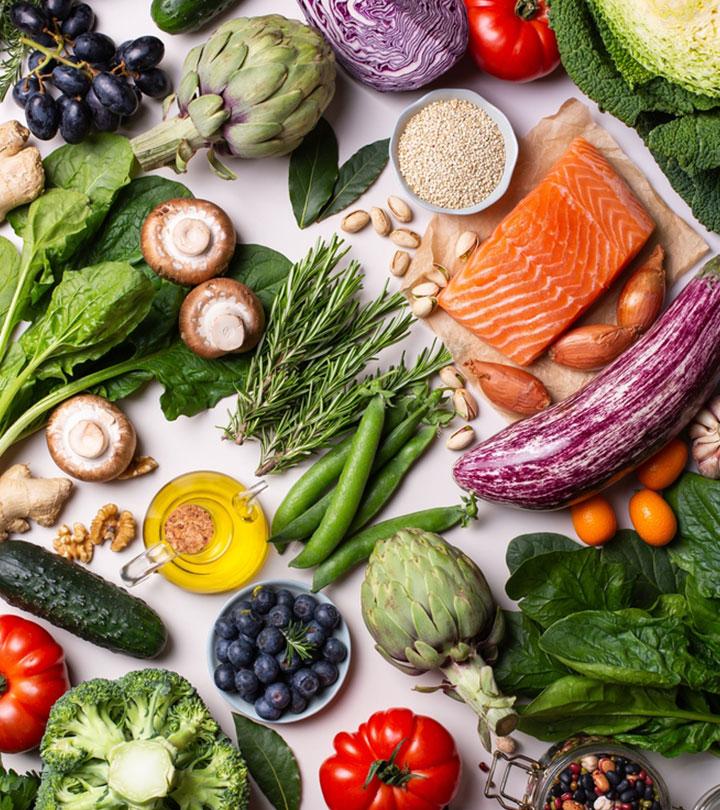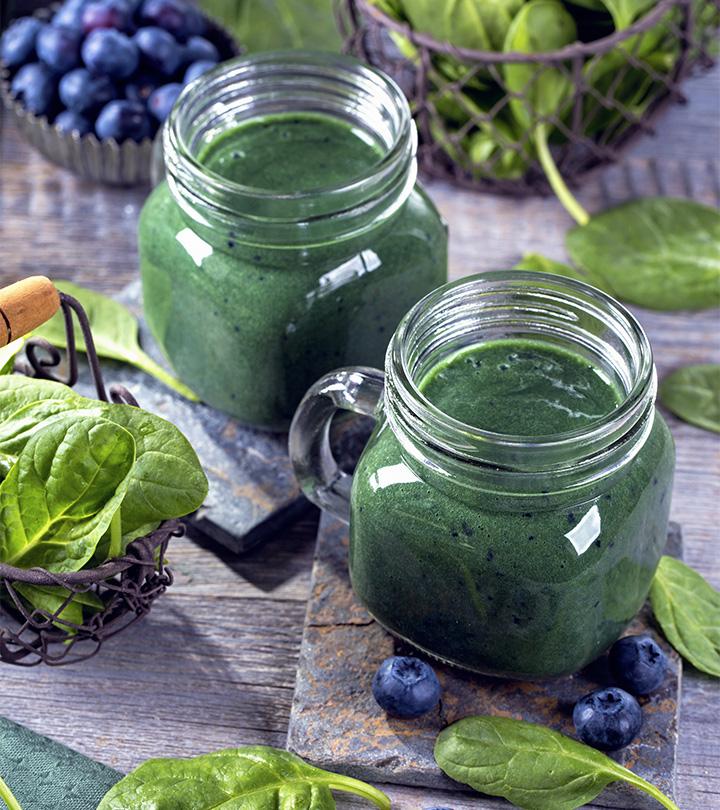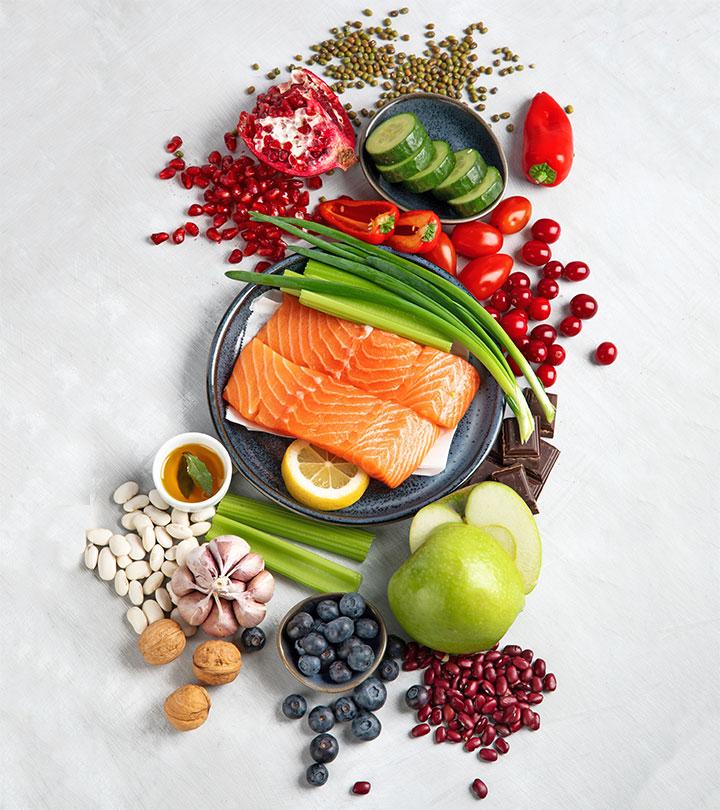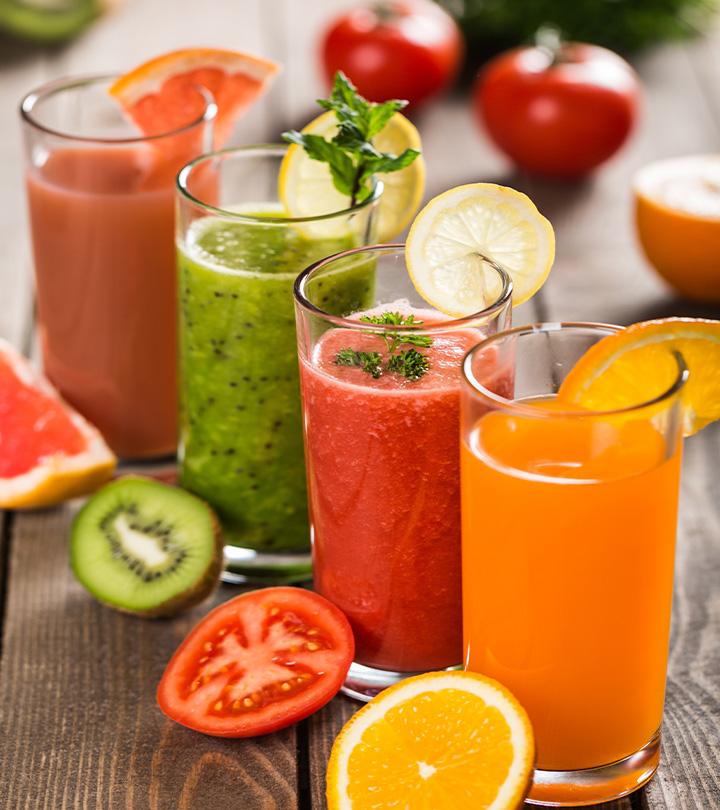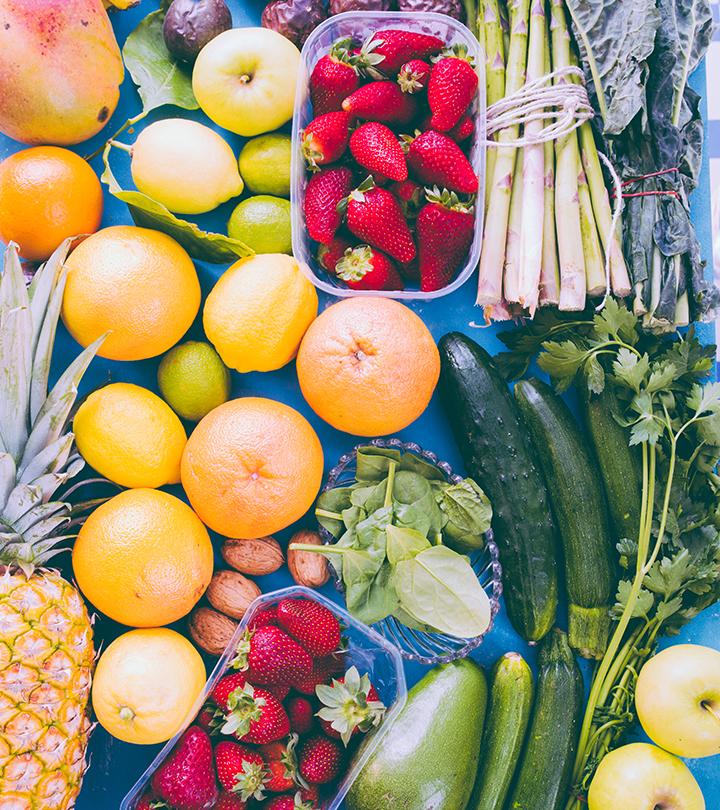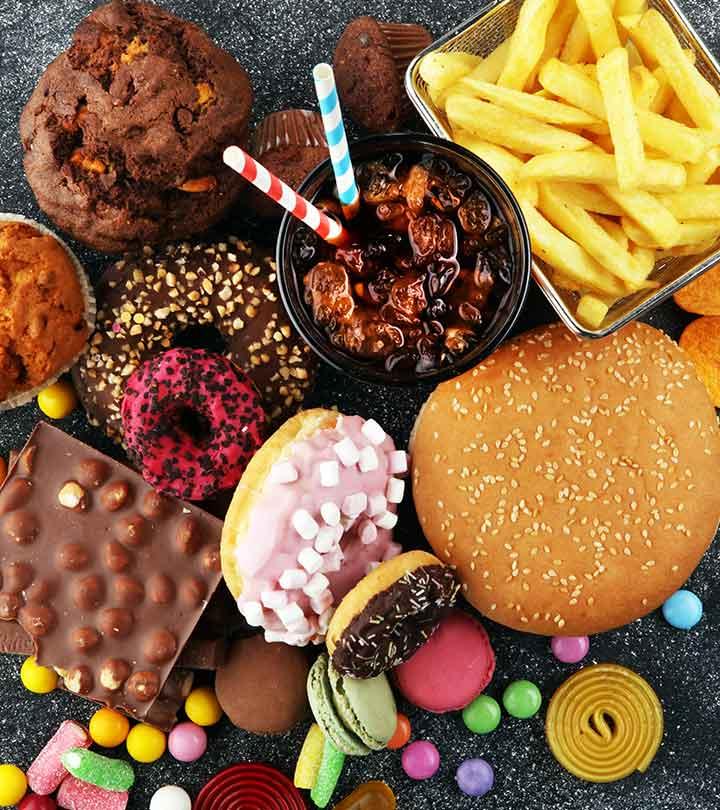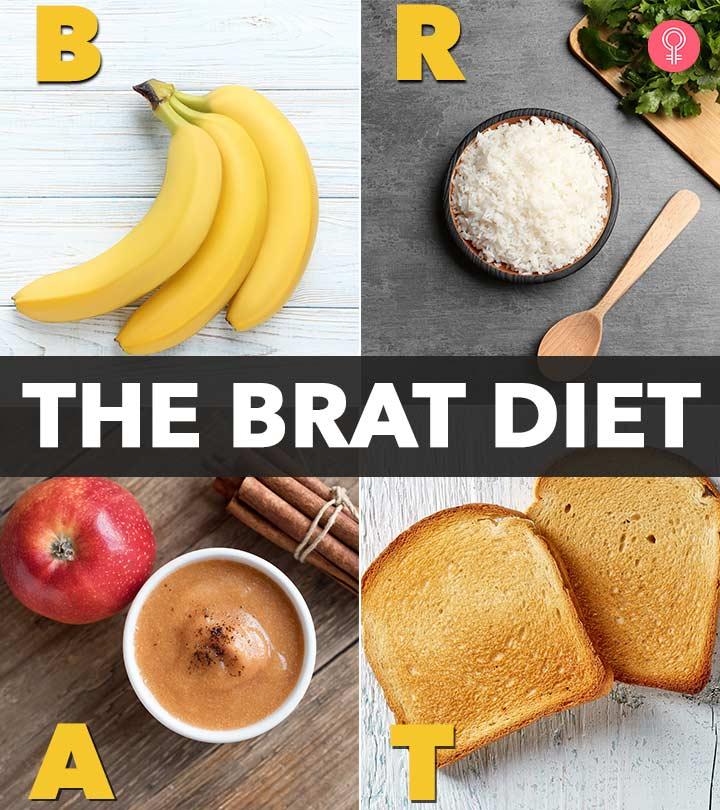Pregnancy Diet Plan: Dietary Tips, Foods To Eat & Avoid, Meal Plan
Embrace the power of healthy and nutritious eating to sail through those nine months smoothly.

A healthy pregnancy demands proper nutrition. It is not just about satisfying your cravings during this time. It is a journey to motherhood that deserves a well-balanced pregnancy diet that nourishes both mother and baby. This dietary program emphasizes the intake of essential nutrients that promotes fetal growth and also reduces the risk of complications. In this article, we have listed food groups to include in your diet, foods to avoid, a sample diet plan, and nutrition tips. Read on!
 At A Glance: Pregnancy Diet
At A Glance: Pregnancy Diet- Principle: Emphasizes the intake of folate, fiber, iron, vitamin D, and calcium-rich foods.
- Purpose: To ensure the growth and development of the baby and minimize the risk of complications.
- Who Is It For: Pregnant women
- Duration: Short-term
- Who Should Avoid: People with nut allergies.
- Cons: May lead to excessive weight gain.
In This Article
What Is A Pregnancy Diet?
A pregnancy diet is a specialized dietary plan that is designed to cater to the nutritional needs of pregnant women. It mainly focuses on the intake of essential nutrients like folic acid, iron, and calcium to prevent neural tube disordersi XA category of birth defects that affect the development of the fetus and cause defects in brain, spine, and spinal cord growth. , anemiai XA medical condition that occurs when your blood produces a lower-than-normal amount of healthy red blood cells. , bone health, and the growth and development of the fetus. Since every pregnancy is unique, tailoring a pregnancy diet to individual nutrient needs is essential. Hence, check with your healthcare provider before making any changes to your diet plan to avoid negative effects.
Now that we have explored what a pregnancy diet is, scroll down to learn the reasons why it is important to maintain a healthy diet during pregnancy
Why Is It Important To Follow A Healthy Diet During Pregnancy?

A healthy pregnancy diet is a great foundation for a safe and successful pregnancy. The intake of proper nutrition during this stage not only promotes the growth and development of the baby but also supports maternal health. According to research, if a growing baby receives insufficient nutrition in the womb, it may increase the risk of diabetes, heart disease, and high blood pressure in adulthood (1). In addition, it helps in postpartum recovery and prepares the body for breastfeeding. Hence, prioritize good nutrition during pregnancy for the health and well-being of both the mother and the developing baby.
Now that we have explored why consuming a healthy diet is important during pregnancy, let’s delve into discussing your nutritional needs during the first trimester and beyond.
Pregnancy Nutrition: First Trimester And Beyond
First Trimester Diet
A nutritious diet is essential for both the mother and the growing fetus during the first trimester of pregnancy. It is important to give your body the nourishment it needs at this time because there are so many developments taking place. Here are the common food groups to include in your diet during the first trimester:
- Fruits (Apples, avocados, berries, bananas, watermelon): Choose 3 to 4 servings of fruits per day. Each serving of fruit can be ½ cup of chopped fresh fruits, ¼ cup of dried fruits, or ¾ cup of fruit juice.
- Vegetables (Dark leafy greens, bell peppers, broccoli, beets, cabbage, sweet potatoes): Try to eat 3 to 5 servings of vegetables per day. A single serving of vegetables can be 1 cup of leafy greens or ½ cup of chopped vegetables.
- Protein (Lean meat, eggs, beans, lentils): Include 2 to 3 servings of protein in your diet. One serving of protein equals 1 cup of beans, or 2 eggs, or 2-3 oz. of meat, or poultry.
- Whole Grains (cereals, whole grain bread): Choose 3 servings of whole grains per day. A single serving of whole grains equals 1 cup of cereals or one slice of whole-grain bread.
- Dairy (Yogurt, cheese, fortified plant milk): Try to consume 3 servings of dairy products per day. Each serving of dairy equals 1 cup of plant milk and yogurt.
Note: Ensure to consult a nutritionist or dietitian to get a well-planned diet chart and know what’s appropriate for you and best for you as per your body type and levels.
Pregnancy Diet To Lose Weight
Though it is possible to lose weight safely during pregnancy, it is not a good idea, unless it is suggested by your gynecologist, depending on your health condition or if you have conceived with a higher BMI. This is because there are several risks, like nutrient deficiencies, fatigue, and developmental delays, associated with losing weight while pregnant. But if you have concerns about your weight during pregnancy, discuss them with your healthcare provider for appropriate guidance and support.
Low-Carb Pregnancy Diet
Low-carb diets are high in fat and protein, and they may also restrict the amount of fruits, vegetables, and fiber you consume. The Institute of Medicine (IOM) recommends greater than 175 g/day of carb intake during pregnancy and warns that less than the recommended values may cause neural tube defects (2). Hence, it is important to check with your healthcare provider before making any changes in your diet during pregnancy to understand your dietary needs.
Not all foods are suitable to include in a pregnancy diet. Scroll down to learn what foods to eat for a safe and healthy pregnancy journey.
Foods To Eat During Pregnancy
- Folate-Rich Foods
Folate is an essential B vitamin (B9) that is very important for both the mother and the baby, especially during the first trimester, and even 5 to 6 months before conception. The recommended dosage of folic acid for women wanting to get pregnant is 0.4 to 0.8 mg per day. Foods rich in folate help prevent neural tube disorders (3). You need 600 mg of folate throughout your pregnancy for the development of the baby. Fruits and fruit juices, seafood, dairy products, meat, nuts, beans, spinach, kale, poultry, asparagus, and brussels sprouts have the highest folate levels (4).
- Calcium-Rich Foods
Calcium is essential for the development of a baby’s bones and teeth (5). According to World Health Organization (WHO) guidelines, the recommended intake of calcium is 1.5 to 2 g/day for pregnant women. Milk, yogurt, cheese, broccoli, kale, and watercress are rich sources of calcium (6).
- Iron-Rich Foods
During pregnancy, there are noticeable increases in red blood cell mass, plasma, and total blood volume (7). To make the additional hemoglobin, your body needs more iron. This mineral helps prevent anemia during pregnancy (8). Your body needs a dose of 30 mg/day at the beginning of the second trimester, when the iron requirements for pregnancy begin to increase. Meat, poultry, fish, and citrus fruits are rich in iron (9).
- Vitamin D-Rich Foods
Vitamin D is essential for the absorption of calcium in the small intestine, which is important for the mineralization of bone (10). According to the European Safety Authority (EFSA) and the Institute of Medicine in the USA, the recommended dosage of vitamin D for pregnant women is 600 IU/day (15 mcg/day) (11). Spending time in the sun and including fortified foods like milk in your diet help improve vitamin D levels.
- Protein-Rich Foods
Protein is an essential nutrient during pregnancy for the growth and development of the baby (12). According to research, approximately 71 g of protein per day is required for pregnant women during the second trimester, which is 25 g more than the dietary requirement for non-pregnant women (13). Meats, lentils, nuts, seafood, eggs, dairy products, beans, and seeds are rich in protein.
- Fiber-Rich Foods
Consumption of adequate fiber may help alleviate constipation, which is common during pregnancy (14). The intake of 25-30 g of dietary fiber is recommended in the second trimester of pregnancy (15). Fruits and vegetables, grains, and legumes are rich in dietary fiber.
- Healthy Fats
Adequate intake of healthy fats like omega-3 fats is essential during pregnancy as these fats are important building blocks of the fetal brain and retina (16). According to the U.S. Food and Drug Administration and Environmental Protection Agency guidelines, pregnant women need at least 8 oz. of seafood (which is rich in omega fats) but not more than 12 oz. (17).
- Supplements
Even if you follow a healthy diet during pregnancy, you may miss out on key nutrients. Hence, check with your healthcare provider before consuming prenatal vitamin supplements, especially folic acid, calcium, or iron, to avoid adverse effects.
These are some essential foods to incorporate into your pregnancy diet. Now scroll down to learn what to avoid during this period.
Foods To Avoid During Pregnancy
Here are some foods to avoid during pregnancy:
- Raw Or Undercooked Seafood: Shellfish, sushi, oysters, mussels
- High-Mercury Fish: King mackerel, shark, tilefish
- Raw Eggs: Undercooked and raw eggs contain salmonella bacteria, which may cause food poisoning (18).
- Raw Sprouts: Alfalfa, mung bean, radish, clover
- Unpasteurized Dairy Products: Unpasteurized milk or other products that may contain harmful Listeria bacteria (19).
In addition, untreated water, reheated hot dogs, alcohol, processed and high-sugar foods, and unwashed fruits and vegetables can cause problems during pregnancy.
 Pro Tip
Pro TipThese are some food groups to avoid during pregnancy, let’s move on to a sample meal plan that promotes the well-being of both mother and baby.
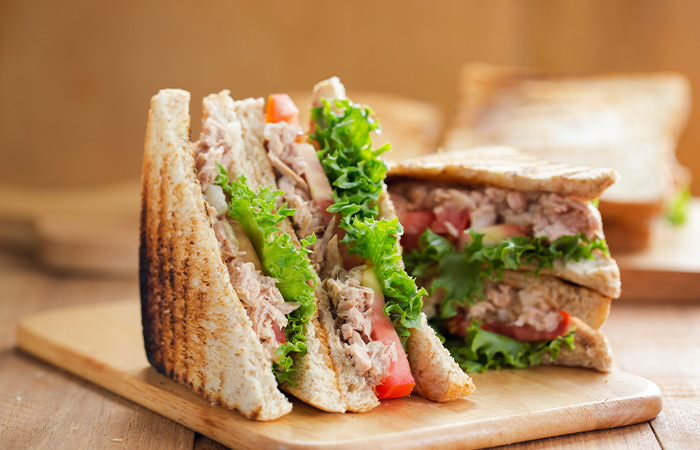
Day 1
- Breakfast: 2 scrambled eggs with spinach and tomatoes, 1 slice of whole-grain toast
- Lunch: 2 pieces of tuna sandwich
- Snack: 1 apple with 2 tablespoons of peanut butter
- Dinner: 1 quinoa-stuffed bell pepper, 1 cup of mixed green salad
Day 2
- Breakfast: ½ cup of oats with a sliced banana
- Lunch: 4 oz. of quinoa salad with 4 oz. of grilled chicken
- Snack: 1 cup smoothie
- Dinner: 2 shredded chicken sandwiches
Day 3
- .Breakfast: 2 whole-grain waffles and 1 cup orange juice
- Lunch: 1 bowl of kale and Brussels sprout salad
- Snack: ½ cup of sliced bell peppers
- Dinner: ½ cup of brown rice and 4 oz of stir-fried chicken
Day 4
- Breakfast: 6 oz. of Greek yogurt and mixed berries
- Lunch: 1 cup of lentil and vegetable stew
- Snack: 1 sliced kiwi
- Dinner: ½ cup of brown rice and 4 oz. of grilled chicken
Day 5
- Breakfast: 1 bagel sandwich
- Lunch: 1 chicken salad wrap
- Snack: ¼ cup of dried fruits and nuts
- Dinner: 4 oz. of baked chicken and ½ cup of mashed sweet potato
Day 6
- Breakfast: Spinach omelet made with 2 eggs
- Lunch: 4 oz. of spinach-stuffed chicken breast
- Snack: Celery sticks with 2 tablespoons of cream cheese
- Dinner: 4 oz. of grilled tofu and ½ cup of brown rice
Day 7
- Breakfast: 2 whole-grain pancakes
- Lunch: 1 cup of lentil soup and ½ cup of quinoa
- Snack: ½ cup of sliced pear
- Dinner: 1 cup of steamed broccoli and 4 oz. of baked salmon
 Pro Tip
Pro TipThis is a sample pregnancy diet meal plan to try. Scroll down to learn some tips on maintaining a healthy diet during pregnancy.
Other Tips To Follow A Healthy Pregnancy Diet

- Excessive sugar consumption during pregnancy may contribute to weight gain and other pregnancy complications, including gestational diabetesi XA type of diabetes that occurs during pregnancy and is characterized by high blood sugar levels. (20). Therefore, limit the consumption of sweetened beverages and snacks.
- Aim for including different colored fruits and vegetables as they often contain unique vitamins, minerals, and antioxidants that help promote overall health.
- Drink enough water throughout the day to help maintain amniotic fluidi XA clear, yellowish protective fluid that surrounds and cushions the baby during pregnancy. levels, prevent dehydration, and support increased blood volume.
- Limit your caffeine intake to 200 mg/day during pregnancy, or about two cups per day. This is because beyond this limit it may lead to miscarriage and stillbirth (21).
- During the second and third trimesters, it is generally recommended to consume an additional 300-500 calories each day to meet the increased energy needs associated with pregnancy (22). However, check with your healthcare professional to get personalized recommendations, as individual calorie needs can vary.
Infographic: Foods To Eat And Avoid During Pregnancy
A healthy pregnancy diet is a balance of both micro and macronutrients that is essential for the growth and development of the baby. Calcium, folate, iron, vitamin D, fiber, and protein-rich foods are key components of this diet plan. We have rounded up the foods to include and avoid in this diet in the infographic below. Check it out to know more!

Illustration: StyleCraze Design Team
A well-balanced pregnancy diet plays a key role in ensuring a safe journey for both mother and baby. This dietary plan emphasizes the intake of nutrient-rich foods that help promote fetal growth and development. Consuming vitamins and mineral-rich foods, while eliminating highly processed and undercooked foods, contributes to a healthy pregnancy. However, consult your healthcare professional before making any changes in your dietary plan to understand your dietary needs, as they are unique for each individual.
Frequently Asked Questions
Can I continue to exercise while following a pregnancy diet?
Yes. If you are healthy and your pregnancy is normal, it is completely safe to continue to exercise while following a pregnancy diet (23). However, check with your doctor before including it in your routine.
Is it safe to consume herbal teas and supplements during pregnancy?
Consumption of herbal teas in moderate amounts, like two cups per day, is recommended during pregnancy (24). However, the intake of these teas in large quantities may interfere with several metabolic processes and cause adverse effects.
Can I eat spicy foods during pregnancy diet?
Yes. Eating spicy foods during pregnancy is safe as long as you consume them in moderation. However, if you experience any discomfort like indigestion or heartburn, reduce your intake.
What is the role of portion control in a pregnancy diet?
Getting the right balance of nutrients is important, as it helps manage your calorie intake and body weight. Portion control helps in weight management within the recommended range.
Key Takeaways
- A balanced pregnancy diet includes a variety of fruits and vegetables, protein, fiber, folate, and iron-rich foods that support the growth of the baby.
- Avoiding raw, undercooked, and high-sugar foods is essential to reduce the risk of contamination and minimize blood sugar levels.
- However, consult your healthcare professional before making any changes in your diet plan during pregnancy to avoid adverse effects.
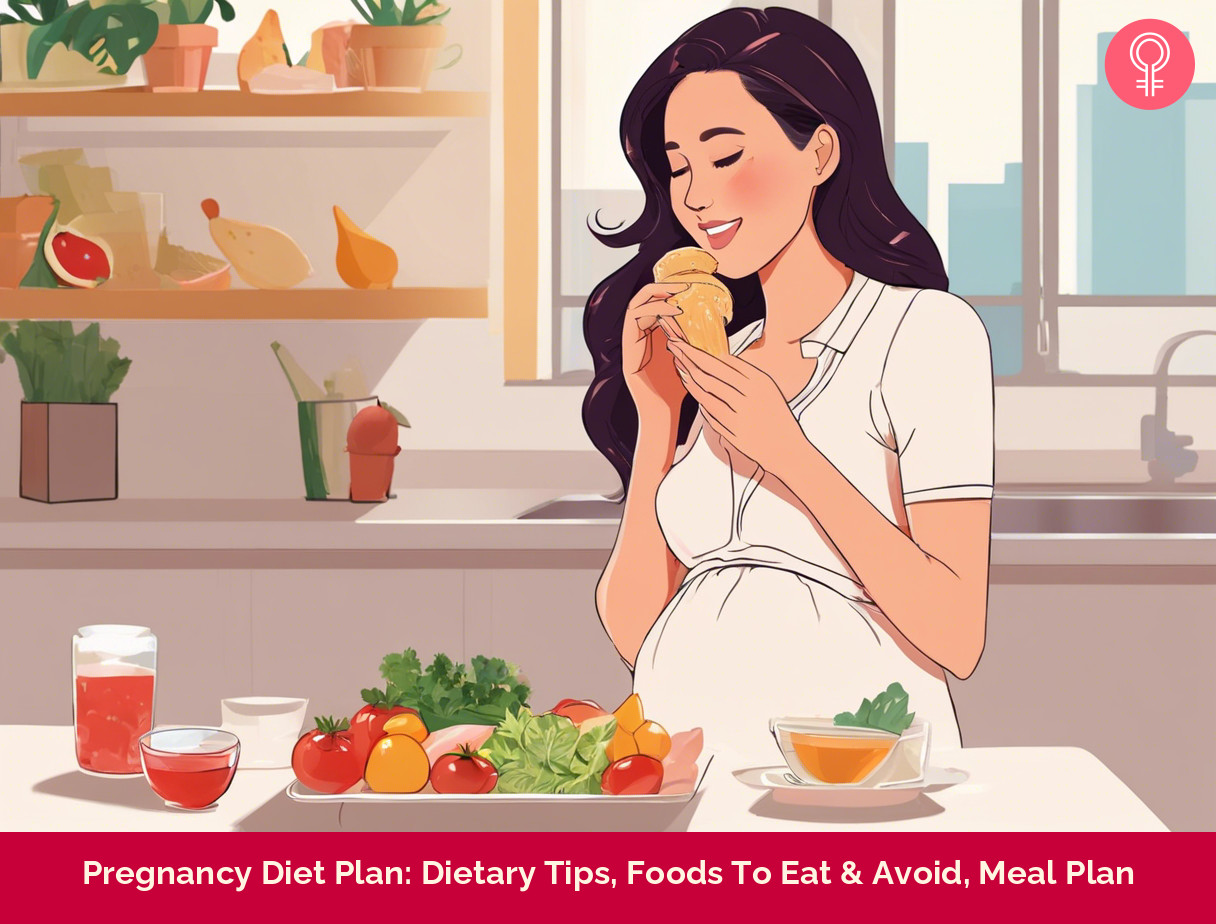
Image: Stable Diffusion/StyleCraze Design Team
Embark on a journey to a healthier pregnancy with this captivating video. Discover how to make nutritious choices, while keeping excess weight at bay. Dive into the world of prenatal nutrition.
References
Articles on StyleCraze are backed by verified information from peer-reviewed and academic research papers, reputed organizations, research institutions, and medical associations to ensure accuracy and relevance. Read our editorial policy to learn more.
- Healthy eating in pregnancy
https://www.nidirect.gov.uk/articles/healthy-eating-pregnancy - The Carbohydrate Threshold in Pregnancy and Gestational Diabetes: How Low Can We Go?
https://www.ncbi.nlm.nih.gov/pmc/articles/PMC8398846/ - Neural Tube Disorders
https://www.ncbi.nlm.nih.gov/books/NBK555903/ - Folate
https://ods.od.nih.gov/factsheets/Folate-HealthProfessional/ - Minerals in Pregnancy and Their Impact on Child Growth and Development
https://www.ncbi.nlm.nih.gov/pmc/articles/PMC7730771/ - Calcium Intake and Health
https://www.ncbi.nlm.nih.gov/pmc/articles/PMC6683260/ - Cardiovascular Physiology of Pregnancy
https://www.ahajournals.org/doi/full/10.1161/circulationaha.114.009029 - Iron Deficiency in Pregnancy
https://www.ncbi.nlm.nih.gov/pmc/articles/PMC7492370/ - Iron Nutrition During Pregnancy
https://www.ncbi.nlm.nih.gov/books/NBK235217/ - Calcium and Vitamin D: Skeletal and Extraskeletal Health
https://www.ncbi.nlm.nih.gov/pmc/articles/PMC2669834/ - Vitamin D supplementation for women during pregnancy
https://www.ncbi.nlm.nih.gov/pmc/articles/PMC6659840/ - Protein and Amino Acids
https://www.ncbi.nlm.nih.gov/books/NBK235221/ - Current Concepts of Maternal Nutrition
https://www.ncbi.nlm.nih.gov/pmc/articles/PMC4949006/ - Association of dietary fiber
liquid intake and lifestyle characteristics with gastrointestinal symptoms and pregnancy outcome - Effects of Additional Dietary Fiber Supplements on Pregnant Women with Gestational Diabetes: A Systematic Review and Meta-Analysis of Randomized Controlled Studies
https://www.ncbi.nlm.nih.gov/pmc/articles/PMC9658588/ - Omega-3 Fatty Acids and Pregnancy
https://www.ncbi.nlm.nih.gov/pmc/articles/PMC3046737/ - Omega-3 Supplements: In Depth
https://www.nccih.nih.gov/health/omega3-supplements-in-depth - Salmonella
https://www.ncbi.nlm.nih.gov/books/NBK555892/ - Disease outbreaks linked to pasteurized and unpasteurized dairy products in Canada and the United States: a systematic review
https://www.ncbi.nlm.nih.gov/pmc/articles/PMC9262997/ - Effects of consuming sugars and alternative sweeteners during pregnancy on maternal and child health: evidence for a secondhand sugar effect
https://www.ncbi.nlm.nih.gov/pmc/articles/PMC7441786/ - Caffeine Intake throughout Pregnancy
and Factors Associated with Non-Compliance with Recommendations: A Cohort Study - Modern dietary guidelines for healthy pregnancy; maximising maternal and foetal outcomes and limiting excessive gestational weight gain
https://pubmed.ncbi.nlm.nih.gov/29842836/ - Exercise During Pregnancy
https://www.acog.org/womens-health/faqs/exercise-during-pregnancy - Frequently Used Herbal Teas During Pregnancy – Short Update
https://www.ncbi.nlm.nih.gov/pmc/articles/PMC7384490/





